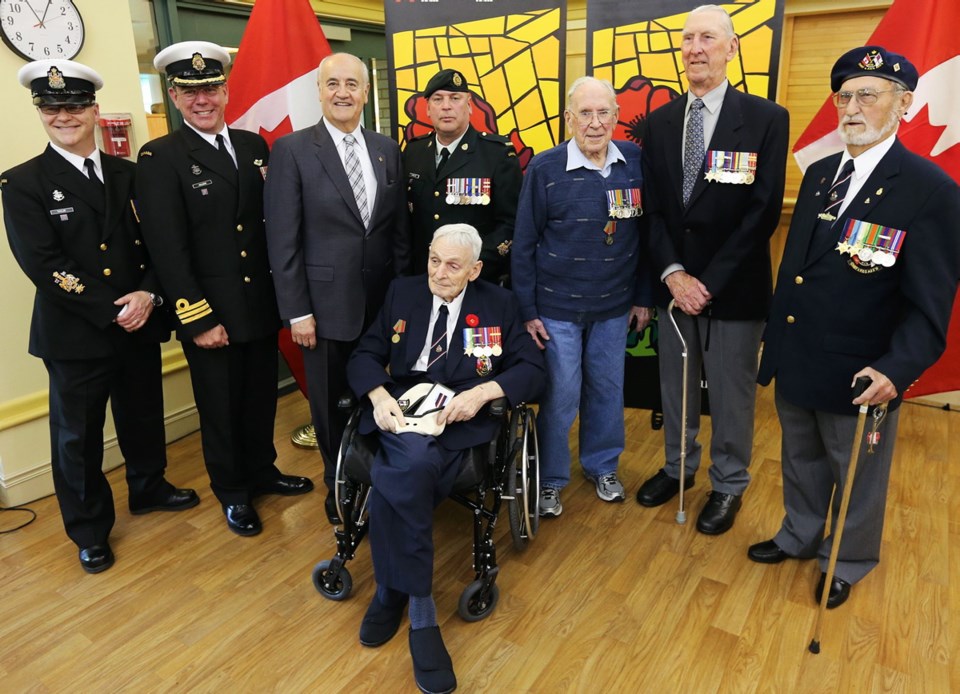Nearly 70 years after the Second World War, four Canadian veterans awarded the British Arctic Star were the first to be presented with their medals in Victoria Thursday.
“While Canadians, the British and all Allied nations have long recognized your role in serving north of the Arctic Circle during the Second World War, it is still only right and proper that you should have our own military honour for such bravery,” Veterans Affairs Minister Julian Fantino said to the men during a ceremony at the Lodge at Broadmead.
The Arctic Star medal is a British honour announced in 2012 and granted to Commonwealth forces members for operational service north of the Arctic Circle from 1939 to 1945.
Many Canadians were among thousands who braved harrowing, freezing seas on ships to supply the Russian ports of Murmansk and Archangel. More than 3,000 sailors died and more than 100 ships were lost.
Although 200 eligible veterans, many in their 80s and 90s, were still alive when the award was unveiled, Canadians did not get official approval to wear the medal from Gov. Gen. David Johnston until April. Despite concern from veterans groups that the delay stemmed from tension between Ottawa and Moscow, Fantino insisted it was a “matter of process” beyond his control.
“I know that it’s been a long time coming. You were there for us when Canada needed you most,” Fantino said.
He presented veterans Norman George Alexander, Edward Earl Dallin, Roland Jacques Lavallee and James S. Russell with their copper star medals.
“Sure took awhile. I didn’t think they were going to let me wear it,” Russell, 88, joked. “It’s a nice recognition later in life, though most entitled to it are probably dead.”
Russell said he doesn’t recall much about his Arctic service on the destroyer HMCS Iroquois and he doesn’t like to. “It was cold, really cold. The trip took three weeks each way,” Russell said.
Born in Scotland, his parents sent him to relatives in Canada as teenager when the war began. To their dismay, he fudged his age at 17 to join the war two years later.
“I liked the uniform and the girls liked it too,” Russell teased. “Honestly, I’m not sure why I joined. It was the thing to do.”
Russell married his wife, Nancy, in Scotland in 1944 and they came to B.C. a few years later. They had two children. Russell managed the old Colwood Inn for 25 years. After Nancy died 17 years ago, he travelled. He now enjoys time with his family, and even played basketball and video games with his great-grandson up to a few years ago.
“We’re very proud of him. He’s a great father,” said Russell’s daughter, Bonnie Hinson.
Lavallee spent 42 years in the military and said he was humbled to add the Arctic Star to his bar of medals. The 90-year-old veteran has been an inspiration to his children, said his son, Paul Lavallee.
“We all work in the public service,” said Lavallee, an army veteran and reservist.
His father occasionally shared stories about his service in the Arctic, telling of water turning to ice, planes overhead and one intense game of hockey with the Russians. But Lavallee said it was the fact his father’s math skills led to him being selected as an engineer on the destroyer HMCS Algonquin that stuck with him.
“There were no calculators or slide rulers at that time. You had to do it in your head. His academic skills might have saved him,” Lavallee said.
Eligible veterans and next-of-kin can apply for the Arctic Star at veterans.gc.ca.



